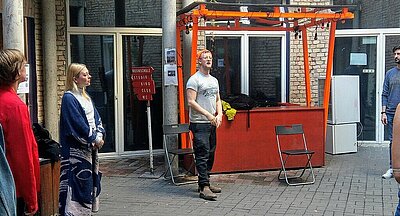Autonomous Sound Collective
Andrea Goetzke and Lukas Dubro from the Collective Practices team at Kunsthaus ACUD speak with Berlin artist and composer Colin Self about his collective singing practice XOIR.

In April, a new series launched at Kunsthaus ACUD: Collective Practices. With a program of workshops, talks and performances it examins collective practice as it relates to artistic creation, cultural organizing and social coexistence. The focus is very much on the “practice”: experiences of and intuitive learning about collectivity under the auspices of common embodied practice. In September and October, artist and composer Colin Self offered his XOIR workshops at ACUD, giving participants the possibility to experiment with their own voice. Andrea Goetzke and Lukas Dubro from the Collective Practices team spoke with him.
Interview: Andrea Goetzke and Lukas Dubro
Colin, what is a XOIR? In what ways does it differ from a choir?
A XOIR is a temporary assembly united in a shared interest in vocal experimentation and exploration. XOIR is a workshop about being autonomous together, advocating for a creative practice of soundmaking outside quantification, recording, and surveillance. XOIR is about prioritizing care and kindness and creating the presence of safety cues, with the aspiration of empowering people to organize and share a grounding practice. A choir is usually about the collective experience of memorizing and reciting songs, usually from sheet music. While we do sing some songs in XOIR, we are not focused primarily on their memorization and recitation.
What does a rehearsal look like?
We don’t have rehearsals because XOIR sessions are not for an audience. We usually don’t record the sessions to encourage people to engage in a creative assembly but not feel the need to post something online with it or make something from it. Instead, I would hope people leave with different experiences; some people might feel a sense of relief or joy or elation from collective sounding. I hope some people leave with a deepened sense of curiosity and willingness to engage in singing and breathing and vocalizing, or to re-examine their own practices through the lens of a col- lective priority.
You said XOIR is about sharing. Would you share some of your favorite XOIR moments with us?
Some really lovely moments happened in the last session at ACUD where I had initiated this activity of people holding long form sounds, and then letting the sounds become more complex over time.
The group began to swirl into some complex, gorgeously imaginative sounding, responding to one another and complimenting each other, until a kind of collective evolutionary sound had appeared. My favorite moments in XOIR sessions are always these circumstances in which I, or someone else, initiates a sound practice, then it kind of gets taken on a journey by everyone participating. There are always generative conversations afterwards about people feeling a sense of transformative attention, and how occupying this space together can be healing for some people.
What do you like about collectives?
Now more than ever I think we are living in a time where isolation is at its worst. We are in a loneliness epidemic and so much of the pain and suffering we experience today is rooted in how surveillance capitalism has separated us from ourselves and others, and that we live in a world that is in dire need of practices that encourage empathy and compassion. I believe collective practices require us to see beyond our individual experience and emancipate ourselves from some of the suffering that occurs from everything being swallowed into capitalism, into quantification and measurement and surveillance. I think we need offline practices to anchor ourselves to the immense toolkits we have in our bodies to create, engage, transform, heal, grow, change, listen...
How could these bodily potentials be realized?
I think these practices can be realized by encouraging and rewarding collective organizing. To ask governing bodies, organizations, and companies to support these kinds of practice, make them accessible and integrate them into policies of social welfare and public health. We need administrative bodies and governing principles that prioritize creative practices that exist outside of productivity models.
That said, what feedback do you receive from XOIR’s participants?
Some of the common conversations I hear after a XOIR session revolve around having positive feelings of connectedness, interdependence, play, and physical relief. Sometimes people mention the pres- ence of safety cues which allows them the capacity to experiment and explore. I often observe circumstances in which people feel surprised by what is possible for a group of strangers to do or make over the course of a few hours in this kind of environment; they often continue to cultivate conversations outside of XOIR. I think XOIR can be trans- formative in the sense that singing with others can give people hope. It can lift spirits and make us feel temporarily freed from the confines of being a single body. XOIR can help connect an individual to the mind’s ear and inner-listening practices. I think it can hone our skills to become better listeners toward others and ourselves.
- November/December 2020
- Editorial
- (Un-)Lust am Text?
- Performative Mixtape
- Homage To Companions
- Rewriting Cultural Codes
- Delightfully Enchanting
- Vain Struggle For Truth?
- The Essence Of Fruit
- Questions Of Faith?
- A Dash Of Strangeness
- Imaginary Landscapes
- Like A Crack In The Air
- Von Abstand bis Zusammensein
- Half-Human Aquatic Study
- Versus Finality
- Longing For Exuberance
- Power Centers Of Bodies and Sound
- The Return Of The Repertoire